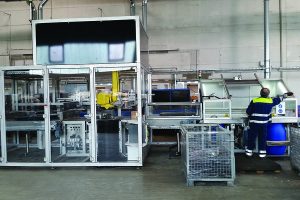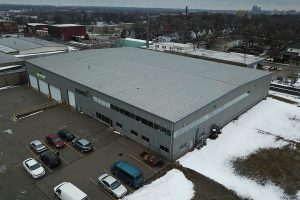
A cryptocurrency mining rig (photo courtesy of Filmar Technologies)
When Serdar Bankaci went looking for a graphics card recently, he found frustration instead.

A cryptocurrency mining rig (photo courtesy of Filmar Technologies)
When Serdar Bankaci went looking for a graphics card recently, he found frustration instead.
 A large-scale, high-tech e-scrap recycling facility in Hong Kong will hold an official opening ceremony next week.
A large-scale, high-tech e-scrap recycling facility in Hong Kong will hold an official opening ceremony next week.
 The e-scrap arm of Arrow Electronics handled nearly 6.3 million used devices last year, 44 percent of which were redeployed, sold or donated for reuse.
The e-scrap arm of Arrow Electronics handled nearly 6.3 million used devices last year, 44 percent of which were redeployed, sold or donated for reuse.
 A smelter owned by metals company Boliden processed 77,000 metric tons of scrap electronics last year, down 6 percent from the year before, according to recently released data.
A smelter owned by metals company Boliden processed 77,000 metric tons of scrap electronics last year, down 6 percent from the year before, according to recently released data.

Total Reclaim was fined by state regulators for storing flat-panel display devices in trailers on Seattle’s Harbor Island.
No longer receiving material from state electronics recycling programs in Washington and Oregon, processor Total Reclaim is attempting to weather recent regulatory hurdles and set its sights on future growth.
 The second half of 2017 saw e-scrap revenues rise for Sims Recycling Solutions, while profits fell due to European market pressures.
The second half of 2017 saw e-scrap revenues rise for Sims Recycling Solutions, while profits fell due to European market pressures.
This story originally appeared in the March 2016 issue of E-Scrap News.
Subscribe today for access to all print content.
The Internet of Things is the latest territory that could hold promise for enterprising electronics recycling operations. The Internet of Things (IoT) market is expected to grow from $9 billion in 2015 to $24 billion by 2021 – and to $33 billion by 2027, according to recent research.
 Processing electronics and processing fluorescent lights are distinct sectors, but they share one important trait: Each carries a risk of exposing your facility and workers to mercury.
Processing electronics and processing fluorescent lights are distinct sectors, but they share one important trait: Each carries a risk of exposing your facility and workers to mercury.

ATR’s facility in Grand Rapids, Mich. Photo courtesy of ATR.
An ITAD company’s growth in Michigan shows how partnering with nonprofit social service groups can present solid business-building opportunities.

